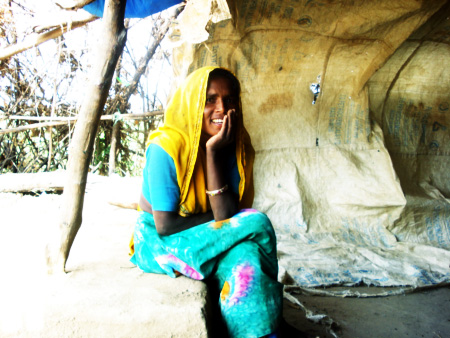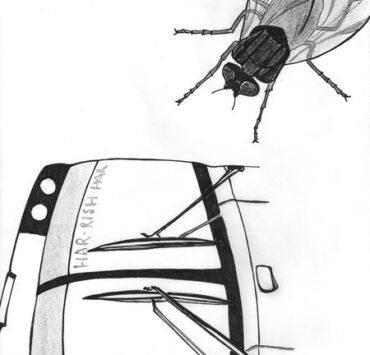Infamous as a person who drinks less water than a camel (yes, recently I had slipped to an all-time low of one glass every two days), my mother says I am the most appropriate person to be researching water scarcity.
As I try to piece together the story of water availability in rural Rajasthan, I have begun to appreciate how it weaves together a farmer’s life so completely. Realising this, my interviews range from dull enumerations of tractors and pump sets to softer issues of flows of information regarding water conservation. However, it is when the conversations spill onto other aspects of rural life that things become interesting.
One of the questions I look forward to most during my interviews with farmers is this: “What, according to you, is necessary for a farmer to be happy?”
The answers range from entertaining to cautious, assured to uncertain. Some laugh off the question self-consciously as if happiness is too unattainable a state to wish for; they look at me quizzically, as if to say, “Happiness? I’m flailing against the vagaries of weather to eke out a living from the land, this year I will have to buy food again. And you ask me of happiness?” Some think the question doesn’t merit their time and mumble a disinterested answer.
Then there are the ones who stare at me unflinchingly, taking in my city shoes, the camera, and voice recorder in one encompassing glance, recognising that I am not one of them. “No wonder she asks strange questions about things like happiness,” they think. It is their eyes I fear to wander into. Some look me straight in the eye, demanding my attention by rattling off their answers. They seem to have thought this through, the list of things that can make them happy is long and often tinged with an expectant (not to be confused with pleading) tone, “Will this girl with her notepad tick some things off the list? A sanction for a well, a new handpump maybe?”
And then there are those who instantly equate happiness with money, a tragic oversimplification in my eyes. But a researcher must be objective and I remember to be all ears. “If I had money, I could be happy. I could dig a well, buy a tractor. Send my children to the new private school (English medium, of course). Yes, money is most important to be happy.” I dutifully write down the answers, “How much money is enough?” my brain counters but I ignore it this time.
* * *

“The person who does not work hard is always unhappy,” says Dhapu Bai. Photograph by Chandni Singh.
Today I found myself in a particularly poor home. The head of the house was chronically ill; he had been so for 10 years now. Two operations and countless prescriptions had left him resigned to his fate, and the household drained of its income. Dhapu Bai, his wife, sat sorting onions. She wore heavy silver anklets but her hands had cheap imitation bangles. She said she had pawned most of her silver to buy medicines for her husband. She told me this in a matter-of-fact voice, not a hint of regret, just a mild sense of resignation one has when fulfilling a duty. Sitting amidst a mound of onions, her actions seemed to be orchestrated by a silent music (but that could be me romanticising the moment). She deftly broke off tender green shoots from the sprouting bulbs, she threw away one that was rotting, but not before salvaging some of it to be used for the evening meal. She scraped at the black sooty residue that had grown on some of the onion skins. She explained how they had grown these onions in the rainy season to last the whole year. “We eat onions everyday with our chapatis, especially when no other vegetable is available. With onion prices shooting up every year, we can’t afford to buy them so we decided to grow enough in our fields this year. Saves some money for the medicines.” She proudly pointed to a bed of chillies nearby, “This year we will have our own chillies too.”
I looked around the house. The uncharacteristically heavy rains had caused one of the mud walls to cave in and it had been ‘repaired’ by draping a yellow sari to keep the wind out. A torn plastic sheet also hung on half-heartedly, flapping in the breeze. I was told that the palm leaf thatch they had made to cover the wall had been stolen last week. “We need to repair this soon because once summer starts, hot winds will blow all day.”
* * *
As I come to the end of the interview, I ask The Question. “What do you think one needs to be happy?” At different times in my life, I have asked myself the same thing and though I have known happiness in many of its varied hues, I am yet to come up with a satisfactory answer. The secret to happiness, so intangible, and yet so familiar, remains too tantalisingly nebulous to encapsulate in words. As if by the very act of articulation, it shall evaporate. And then, unable to construct an answer that suitably captures all my thoughts, I feel warped by the inadequacies of language as a form of expression. So, whenever I pose the question, a part of me always hopes to hear someone assemble my unwieldy ideas, revealing my answers to myself.
Dhapu Bai starts off before her husband can say anything. A dilapidated home, an ailing husband, a small plot of land, and the uncertain rains. She has had enough to complain about and banish happiness from her vocabulary. But she answered, “The person who does not work hard is always unhappy. When you have nothing to do, you focus on what you don’t have. I work hard at home, I work harder in our fields. How can I be unhappy as long as I have work to do? I…”
Mid-sentence she collapsed into peals of laughter and I turned to see Rajmal, my translator playing the fool. He had the camera and was clicking away at Dhapu Bai. The whole thing tickled her so much that she carried on laughing, blushing like a schoolgirl, and playfully telling Rajmal to stop. I watched her face sparkle with laughter, her husband hit his palm on his leg repeatedly, guffawing. Rajmal carried on his antics; she instructed him to stop in mock anger. The pungent smell of those onions, the sound of the plastic sheet flapping loudly in the wind, that sense of joy that emanates from unadulterated laughter. I couldn’t help but join in.








